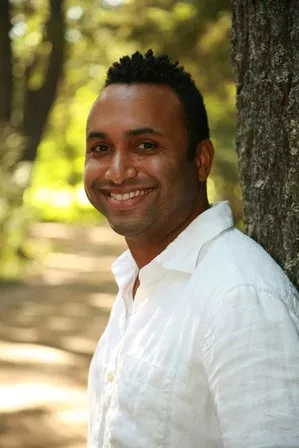Filmmaker Rodney Evans Talks New Doc on Visually Impaired Artists, Including Himself

Fresh Air: ‘Vision Portraits’ Filmmaker Wanted to Chronicle Other Artists Who Are Blind
Visiting Assistant Professor of Film & Media Studies Rodney Evans joined the NPR program Fresh Air to discuss his recent documentary film Vision Portraits, an exploration of blind and visually impaired artists, including himself. The film had its Philadelphia premiere at the BlackStar Film Festival in August.
Terry Gross: After he started losing his eyesight when he was in his 20s, Evans wanted to continue making movies, and he still has enough sight left to enable him to do that. He wanted to know what it was like for other artists who have lost much or all of their vision, and he wanted their advice. That led to his new documentary, Vision Portraits. It tells his story and the stories of three other blind or partially sighted artists—a photographer, a dancer, and a writer.
Evans says all the artists in the film are deeply influenced and motivated by the power of art to heal and transform. Evans also wrote and directed the film Brother to Brother, which won the Special Grand Jury Prize at the 2004 Sundance Film Festival. It starred Anthony Mackie as a young gay man who meets an older gay man who was part of a circle of artists and writers during the Harlem Renaissance. Evans is now working on a film dramatizing the life of composer and pianist Billy Strayhorn, who worked with Duke Ellington for most of his career.
Rodney Evans, welcome to Fresh Air. I think a lot of our audience will be wondering, how can you make movies if you can hardly see? So let’s start with, what can you see? How much vision remains?
Rodney Evans: I have about 9 percent vision in one eye and 8 percent in the other eye. And it fluctuates. So sometimes that goes up, and sometimes that goes down. But in general, it’s about 20 percent of vision. But it is very localized in the center. So the condition I have, which is technically called retinitis pigmentosa, basically destroys your peripheral vision. So it leaves you with no peripheral vision and very minimal night vision. But I do have very clear central vision. So my vision is—often, I describe it as akin to looking through a telescope or a horse with blinders.
...
Gross: Why did you want to make a film about other visually impaired artists who’ve continued to do their work?
Evans: Because I was terrified, frankly, about losing my vision and whether or not I would be able to continue creating films and doing this art form that I was really passionate about. So, you know, I just have this tendency of confronting my fears head on. So if something terrifies me, I know that that’s where I need to go as an artist, and that’s what I should be making art about. And I should figure out why it’s terrifying to me and what’s scary about it. So for me, I think that was the launching point for Vision Portraits and just to, you know, take that to the endpoint and just think to myself, “OK, so what if you do go blind? What would happen? How would you create your art? How do other people do it?”
How would a blind photographer continue to make photographs? How would a blind writer continue to write essays and memoirs and screenplays? How would a visually impaired dancer navigate the space of a stage not knowing where the obstacles on this stage might be? All of that just became really fascinating to me, just how each artist tackled the obstacles of blindness and low vision and continue to create their art.
Read the transcript of the full interview.
Visiting Assistant Professor of Film & Media Studies Rodney Evans is the writer, director, and producer of the feature film Brother to Brother, which won the Special Jury Prize in Drama at the Sundance Film Festival. The film had its European premiere at the Berlin International Film Festival and was nominated for four Independent Spirit Awards, including Best First Film and Best First Screenplay. His second feature-length screenplay, Day Dream, is the first-place winner of the Newfest Screenplay competition. Evans has received funding from the Guggenheim Foundation, the Creative Capital Foundation, the New York State Council on the Arts, and the Independent Television Service. At Swarthmore, Evans teaches courses in screenwriting, digital production fundamentals, and the relationship between the director and the actor.



